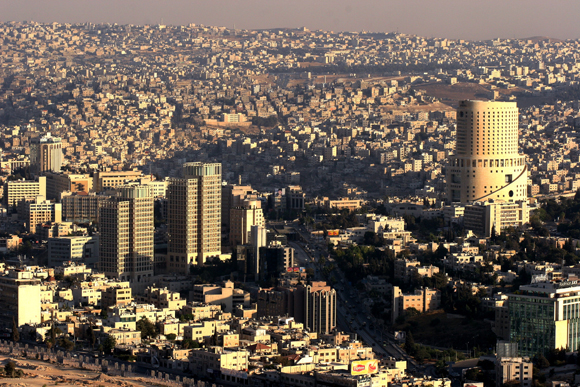Jordan Fiscal Policy
The overall Jordanian economy has been marked by the following characteristics, challenges, and problems.

Finance and Fiscal Policy
The world financial crisis had the effect of exposing two glaring weaknesses in the economy: The government’s annual deficit rose to over $2 bn USD in 2010, constituting 9% of annual GDP; and total public debt both foreign and domestic rose to JD 10.34 bn relative to GDP of JD17.77 bn., a ratio of 58.2%.
Secretary General of the Amman Chamber of Commerce,
Bassem Faradj
Our budget is JD5 billion, of which JD1.5 billion goes towards wages and pensions, and this is a sizable drain on the economy.
This is dangerously close to the legal public debt limit of 60%.
This has forced an agonizing reappraisal of government employment and welfare policy. More than 67% of Jordan’s labor force is in the service sector, much of it on the government payroll. The poses the dilemma: On the one hand, budget cuts cannot easily be made without increasing unemployment and endangering growth.
On the other hand, major capital projects cannot be easily cut either, since they offer the only hope of providing employment in the private sector and raising GDP.
Bassem Faradj, Secretary General of the Amman Chamber of Commerce and CEO of ATG, sees the problems as structural.
“The major challenges that we face are structural. By this I mean we have a large public sector and the number of public sector servants is something that needs to be approached with caution because they consume and drain our government’s budget.
Our budget is JD5 billion, of which JD1.5 billion goes towards wages and pensions, and this is a sizable drain on the economy. We have major expenses and if we try to squeeze our budget it is at the expense of the capital expenses for projects and infrastructure.”
His solution: “We really need a paradigm shift with regard to how we move forward and try to figure out how to further engage the private sector. This is a big task to undertake but I believe the government is moving in the right direction.
Our plan is very fiscally focused with increasing revenue, monetarily driven to encourage the banks to give more money…and also to encourage investment, particularly foreign direct investment to stimulate the economy and create jobs. Unemployment is another challenge Jordan has to face due to the economic slowdown.”
The government has set a goal of cutting expenditures in 2010 by $1.4 bn in 2010, slashing the deficit to 6.3% of GDP. As of September 2010, it appears to be approaching its goal. The strategy, according to Simona Sabella of Arab Banking Corporation, is to reduce spending, but maintain the focus on “what’s necessary to grow.”
Bisher Jardaneh, CEO of Arabtech Jardaneh and Chairman of InvestBank sees things “in a long term perspective rather than quick fixes….Today, 67% of Jordan’s economy is service-oriented and I can see those service industries becoming more attuned with international best practices and are able to actually live up to the international promise in terms of service delivery….
On the other side, the government has been up for change and I hope that this will be a sustainable mindset—to realize that they can no longer sustain this as a welfare society and that they have to enable the private sector to become more independent…[They] realize that their only choice forward is to enable the private sector to start creating the opportunities.”
Ghassan Nuqul
of Nuqui Group
We need to think of mega projects where the private sector can take lead.
Ghassan Nuqul of Nuqul Group believes that “We need to think of mega projects where the private sector can take lead.”
Jordan is moving ahead on a variety of “mega projects” which it hopes will ameliorate the problems of unemployment and welfare cuts, while at the same time insure future growth. One of these is a master rail plan, linking cities in Jordan and extending west into Iraq and north to Damascus.
Another is the famous “Red-Dead Project,” a huge canal to carry water from the Red Sea to the Dead Sea, with power generating and desalinization facilities to provide electrical energy as well as fresh water for irrigation.
Nasser Sunaa, CEO of Jordan Investment Board (JIB), believes that what differentiates Jordan from other countries “are three core competencies that Jordan enjoys as a country. First is the economic political safety, security, and stability. Second is the skilled human capital that the country enjoys. Third is the market access agreements, and that is what positions Jordan as a gateway to the region and beyond.
 Jordan as a market is a small market with a population of 6 million and a GDP of 3700 per capita, so the level of disposable income is not great, but Jordan is a gateway to the Middle East and even beyond that because of the free trade agreements with the US and Canada, the EU, and the Arab world. In total, those market access agreements give Jordanian goods and services access to markets in excess of 1 billion consumers.
Jordan as a market is a small market with a population of 6 million and a GDP of 3700 per capita, so the level of disposable income is not great, but Jordan is a gateway to the Middle East and even beyond that because of the free trade agreements with the US and Canada, the EU, and the Arab world. In total, those market access agreements give Jordanian goods and services access to markets in excess of 1 billion consumers.
And that is what positions Jordan to be an ideal location to do business in this part of the world.”
The JIB continues to seek FDI for all of Jordan’s growing sectors, and encourages PPPs—public private partnerships for its many mega projects, facilities and industries.